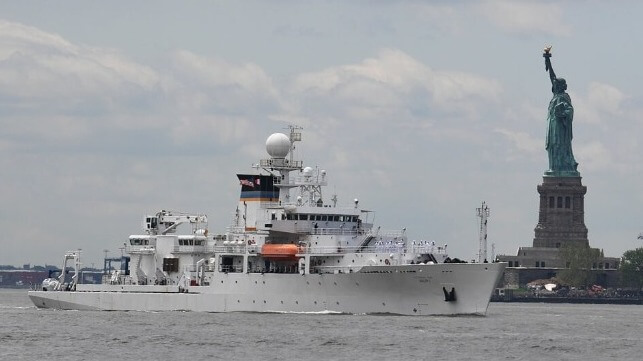U.S. Navy Renames Research Ship Over Namesake's Confederate Ties

Following the advice of the Congressional Naming Commission, the U.S. Navy is renaming the Pathfinder-class oceanographic research vessel USNS Maury, removing one of the last references to the Confederacy from its fleet.
USNS Maury was named for Commander Matthew Fontaine Maury, known as a brilliant scientist, first superintendent of the U.S. Naval Observatory, "father of oceanography," creator of the first systematic wind and current observation system, and the leading proponent of an “Amazonian Republic” - an international enterprise connecting slaveowners in the American South with new slave-based colonial opportunities in the Brazilian Amazon.
Maury was against secession, but when the war broke out in 1861, he resigned his commission and defected to the Confederacy. Appointed chief of the Confederate Navy's harbor defense bureau, his first task was to develop a remotely-actuated naval mine for use against American warships. This device worked as designed, and the U.S. Navy "lost more vessels from Confederate torpedoes [mines] than from all other causes combined," according to then-Secretary of the Navy Gideon Welles.
His second task was to travel to England, where he pursued diplomatic efforts and quietly worked to acquire ships for the Confederacy. He played a role in commissioning an English yard to build the Confederate cruiser CSS Georgia, which had a brief but successful run as a raider of American commerce. After the war's end, Maury promoted an effort to set up a place of refuge for ex-Confederates in Mexico, known as the New Virginia Colony, but the venture came to a close after two years.
Maury is widely recognized for the groundbreaking scientific work he completed before the war, as well as his profound service to merchant shipping, but his ties to the Confederate Navy were too close for the Naming Commission. The panel has recommended changing the names of all "Department of Navy assets that commemorate the Confederacy or individuals who voluntarily served with the Confederacy."
Going forward, the USNS Maury will be known as the USNS Marie Tharpe, after the oceanographer who created the first comprehensive seabed maps of the Atlantic Ocean.
“[Tharp's] dedication to research brought life to the unknown ocean world and proved important information about the earth, all while being a woman in a male-dominated industry,” said Secretary of the Navy Carlos Del Toro in a statement. “As the history of our great nation evolves, we must put forth the effort to recognize figures who positively influenced our society. This renaming honors just one of the many historic women who have made a significant impact on not only our navy, but our nation.”
Tharp was born in 1920 and graduated from Ohio University in 1943. She completed a masters in geology at the University of Michigan and became one of the first women to work at the Lamont Geological Observatory. Between 1946 and 1952, the research vessel Atlantis used sonar to obtain soundings of the North Atlantic, which Tharp and colleague Bruce Heezen used to create detailed seafloor profiles and maps. While examining these profiles, Tharp discovered a rift valley along a mid-oceanic ridge, supplying new evidence for the theory of continental drift - a controversial idea at the time. Her work aided development of the plate tectonic theory, a bedrock concept of modern geology. The National Geographic Society later awarded Tharp its highest honor, the Hubbard Medal.
The Navy chose International Women's Day for the timing of the announcement. The renaming process for USNS Marie Tharpe begins immediately and should have minimal impact on the vessel's current operations in the Persian Gulf.

that matters most
Get the latest maritime news delivered to your inbox daily.
USNS Pathfinder (T-AGS 60) was also named after Maury, who was nicknamed "Pathfinder of the Seas" for his service to navigation. The vessel is in active service and is not slated for renaming.
The Navy has already followed the commission's guidance for the cruiser USS Chancellorsville, originally named for a land battle that the Union lost. She is now named USS Robert Smalls, after a former slave who commandeered a Confederate ship.
